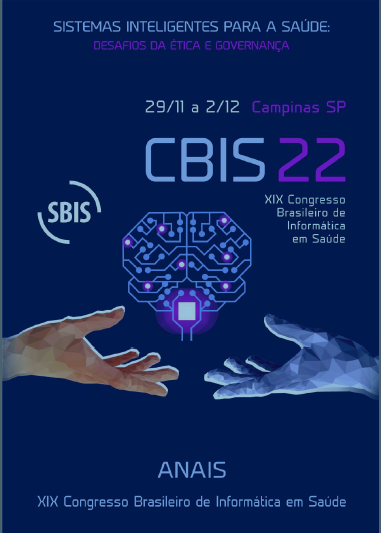Asistente Virtual en Educación para la Salud del Hombres
DOI:
https://doi.org/10.59681/2175-4411.v15.iEspecial.2023.1087Palabras clave:
Educación en Salud, Tecnología Educacional, Salud del HombreResumen
Objetivo: Este artículo tiene como objetivo ofrecer un método efectivo de educación para la salud a través de IChatSUS, un Agente de Conversación Inteligente que puede preguntar sobre problemas de salud de los hombres. Metodo: A fue observacional descriptivo con un enfoque cualitativo y cualitativo a través de un estudio transversal. Se llevó a cabo con 20 participantes para evaluar la usabilidad de IChatSUS y la experiencia del usuario a través de estudios de System Usability Score y User Experience Questionnaire. Resultados: En cuanto a la muestra, 90% tenía acceso a internet, el 95% de los usuarios tenía perfil tecnológico y desconocía sobre chatbots. La usabilidad de IChatSUS reveló una necesidad de mejora. Al evaluar la Experiencia de Usuario, los resultados fueron optimistas. Conclusión: El uso de IChatSUS para la educación en salud es excelente como rendimiento, pero requiere mantenimiento. Es necesario ampliar el público y el ambiente para mejor uso de IChatSUS.
Citas
Araújo MG, Lima GA, Holanda CS, Carvalho JB, Sales LK. Professional opinion on the effectiveness of the National Policy of Comprehensive Health Care for Men. Escola Anna Nery - Revista de Enfermagem. 2014;18(4). Doi:10.5935/1414-8145.20140097.
Brito RS, Santos DLA. Barriers to implementing health care programs for male publics: health professionals’ views. UERJ Nursing Journal, 2014;21(5);654-9. Available in: https://www.e-publicacoes.uerj.br/index.php/enfermagemuerj/article/view/10044/7832.
Dourado JL, Alves RS. Prisoner’s health overview: access difficulties to healthcare. Academia Paulista de Psicologia. 2020;39(96). Doi:10.5935/2176-3038.20190005.
Silva AS, Barbosa MG, Souza AP, Rocha AA, Carvalho TW, Oliveira Lins SR. Health of man: difficulties found by male population to access family health services (USF). Brazilian Journal of Health Review. 2020;3(2):1966-1989. Doi:10.34119/bjhrv3n2-055.
Su MH, Wu CH, Huang KY, Hong QB, Wang HM. A chatbot using LSTM-based multi-layer embedding for elderly care. Proceedings of the 2017 International Conference on Orange Technologies, ICOT 2017. 2017; 70-74. Doi: 10.1109/ICOT.2017.8336091.
Melo ECA, Enders BC, Basto ML. Plataforma PEnsinar®: a learning tool for teaching the nursing process. Rev Bras Enferm [Internet]. 2018;71(Suppl 4):1522-30. [Thematic Issue: Education and teaching in Nursing]. Doi: http://dx.doi.org/10.1590/0034-7167-2016-0411.
King AC, Campero I, Sheats JL et al. Testing the comparative effects of physical activity advice by humans vs. computers in underserved populations: The COMPASS trial design, methods, and baseline characteristics. Contemporary Clinical Trials. 2017;61:115-125. Doi:10.1016/j.cct.2017.07.020.
Owens OL, Felder T, Tavakoli AS et al. Evaluation of a Computer-Based Decision Aid for Promoting Informed Prostate Cancer Screening Decisions Among African American Men: iDecide. American Journal of Health Promotion. 2018;33(2):267-278. Doi:10.1177/0890117118786866.
Wu Y, Samant D, Squibbs K, Chaet A, Morshedi B, Barnes LE. Design of interactive cancer education technology for Latina farmworkers. In: 2014 Systems and Information Engineering Design Symposium (SIEDS). IEEE; 2014. doi:10.1109/sieds.2014.6829908.
Jack B, Bickmore T, Hempstead M et al. Reducing Preconception Risks Among African American Women with Conversational Agent Technology. The Journal of the American Board of Family Medicine. 2015;28(4):441-451. Doi:10.3122/jabfm.2015.04.140327.
Cursino JRV, Campos Filho AS, Calista AA, Nascimento, JEM. An Integrative Review on the Use of Chatbot to Support Health Education. Rev. Saúde Digital Tec. Educ. 2020;5(1):108-122. Doi:10.36517/resdite.v5.n1.2020.a8
Bangor A, Kortum PT, Miller JT. An Empirical Evaluation of the System Usability Scale. International Journal of Human-Computer Interaction. 2008;24(6):574-594. doi:10.1080/10447310802205776.
Almayyan W, Alsuwaidi M, AlGhannam BA. Perceived Usability of Arabic System Usability Scale (A-SUS): Faculty Members’ Perspective of Smart PAAET Application. International Journal of Computer Applications. 2021;183(37):17-22. Doi:10.5120/ijca2021921757.
Laugwitz B, Held T, Schrepp M. Construction and Evaluation of a User Experience Questionnaire. In: Lecture Notes in Computer Science. Springer Berlin Heidelberg; 2008:63-76. doi:10.1007/978-3-540-89350-9_6.
IBGE, Instituto Brasileiro de Geografia e Estatística [Internet]. Educação. 2019. Available in: chrome-extension://efaidnbmnnnibpcajpcglclefindmkaj/https://biblioteca.ibge.gov.br/visualizacao/livros/liv101736_informativo.pdf.
IBGE, Instituto Brasileiro de Geografia e Estatística [Internet]. Uso de Internet, televisão e celular no Brasil. 2019. Available in: chrome-extension://efaidnbmnnnibpcajpcglclefindmkaj/https://biblioteca.ibge.gov.br/visualizacao/livros/liv101794_informativo.pdf
Descargas
Publicado
Cómo citar
Número
Sección
Licencia
Derechos de autor 2023 Amadeu Sá de Campos Filho, Jose Ricardo Vasconcelos Cursino, Thomé Décio Pinheiro Barros Júnior, Évelyn Cristina Morais Pessôa Lima

Esta obra está bajo una licencia internacional Creative Commons Atribución-NoComercial-CompartirIgual 4.0.
La sumisión de un artículo a el Journal of Health Informatics es entendida como exclusiva y que no esta siendo considerado para publicación en otro periódico. La permisión de los autores para la publicación de su artículo en lo JHI implica en la exclusiva autorización concedida a los editores para su inclusión en la revista. Al someter un artículo, a lo autor será solicitada la permisión electrónica de una Nota de Copyright. Una mensaje electrónica será enviada a lo autor correspondiente confirmando el recibo del manuscrito y lo aceite de la Nota de Copyright.


